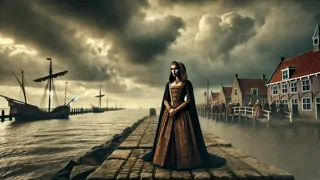Introduction
Along the craggy coastline of Friesland, where fierce winds whip the salt-laced air and restless tides carve the shore, the city of Stavoren rose to prosperity on the strength of its bustling harbor. In those days, sleek ships from distant realms arrived daily, laden with spices as golden as sunlight, silks dyed in vibrant hues, and exotic treasures coveted by noble courts. It was within this realm of plenty that the Lady of Stavoren reigned, draped in velvet and brocade, her coffers brimming beyond measure. Her palace stood on a bluff overlooking the quay, its towers gleaming in the dawn, and from there she observed her domain with a gaze as cold and still as the North Sea itself. The people respected her generosity when trade flourished, but they trembled in suspicion whenever she turned her back on the pleas of the poor. Whispers trailed through narrow alleyways and smoky taverns—rumors that her heart was locked fast against charity, that her only devotion lay with gold. And though many sought to soften her resolve, they found her spirit unyielding. It was on an afternoon painted with low-hanging clouds, as seagulls cried overhead and merchant flags snapped in the breeze, that the Lady’s pride would set in motion a chain of events neither she nor her city could ever escape.
Fortune’s Favour and the Seeds of Pride
The Lady of Stavoren’s fortune was the envy of every coastal town between Heligoland and the Frisian Isles. Each dawn, she greeted the docks in glittering gowns stitched with threads of pure gold, bestowing generous bounties upon captains who delivered the richest cargo. Fishers who once toiled in open skiffs found their nets mended with silk lines and their hulls scraped free of barnacles, all at her expense. Caravans stretched from northern forests, bearing timber and tar, while Flemish traders offered cloth dyed the deepest shades of scarlet and indigo. Behind the scenes, guild masters whispered blessings, for the Lady’s patronage ensured every workshop thrived, every artisan prospered.

Yet with every gift she gave, her heart hardened like iron cooled in the sea. She listened only to praise, and she rewarded only those who flattered her brilliance. Beggars at the gate were turned away with harsh words; wounded soldiers found no comfort in her halls. She who had once been praised for her benevolence now wore pride as a crown more dazzling than any diadem. Town meetings fell silent when she spoke, for her word alone carried the weight of law. Harbor dues rose to feed her coffers, but still the Lady insisted it was not enough. Whispers of her cruelty spread beyond the city—fishermen told of families driven to starve, mothers begging at her gate with empty baskets. And yet, nobody dared decry her openly, for her guards were ever watchful and her edicts swift.
At the center of her grand hall stood a marble table heaped with platters of delicacies; chambers brimmed with carpets imported from Baghdad and tapestries woven in the courts of Byzantium. Cabinet doors bore inlaid mother-of-pearl, and chalices of rare glass glittered in rows upon silver trays. In the deepest vault of her cellar lay chests bursting with coins—Dutch groats, Florentine florins, and Venetian ducats—each stamped with a portrait of some distant ruler. Her wealth overflowed across every corner of Stavoren, yet she measured nothing by need or by kindness. Instead, she gauged her worth by the endless weight of her treasure, her ambition rising like the tides that nourished her harbor.
Late one evening, as the lamps burned low in the vaulted corridors, a humble sailor knelt before her. He brought word of an ailing neighbor’s child, her home lost to the sea’s encroachment. The sailor’s voice trembled with hope, but the Lady’s eyes flickered only with impatience. Without a word, she bid him leave and barred the gates. The sailor rose, crestfallen, and walked into the chill night under a sky thick with clouds. Behind him, the Lady returned to her solitude, untouched by sorrow and unmoved by the suffering she had rebuffed. It was then—standing alone among her riches, listening only to the hush of distant waves—that her pride sealed the fate of all Stavoren.
The Golden Ring and the Omen of Doom
In her private treasury, the Lady possessed a single ring of unparalleled beauty—a band of burnished gold set with a flawless sapphire the color of the deepest sea. Legend whispered that the gem had once lain beneath coral reefs, touched by mermaids’ tears, and that any who wore it would command the ocean’s favor. The Lady cherished the ring above all else, slipping it onto her slender finger each morning as a token of her unmatched sovereignty. When word spread of its power, merchants and pilgrims ventured from faraway lands to catch a glimpse, for they believed its magic could turn tides of fortune themselves.

One stormy afternoon, rumors of a famine reached the Lady’s towers. Crops along the lowlands had failed under scorching sun, and fishermen found empty nets where once schools of herring teemed. The people of Stavoren fell to hunger and fever, while the Lady remained enfolded in her silk cloaks, her treasury bursting with gold. Civic leaders pleaded at her door, but she dismissed them with a condescending smile and a curt nod. “Let the sea provide,” she said, her voice echoing through the marble halls, “for I cannot sanction gifts that diminish my own largesse.”
Anger swelled in the council chamber when each benediction was refused. Deputies accused her of callousness; priests warned of divine wrath. Yet their words faded against the harder steel of her resolve. In a gesture meant to seal her defiance, the Lady lifted her sapphire ring and hurled it into the roiling waves beyond the sea wall. Gasps rose among onlookers as the gem vanished beneath whitecaps, leaving nothing but ripples that spread toward the shadowed horizon. For a moment the wind stilled, and in that silence, an unseen force seemed to gather its breath.
By dawn, sea foam crept over the quays as if in pursuit of the stolen treasure. Breakwater stones shifted under an unseen weight, and the harbor sluices groaned as brackish waters surged through channels that had once been dry. Fishermen watched in horror as their boats listed at impossible angles, their lines tangled amidst the rising tide. The Lady fled to her highest tower, but through her windows she beheld the harbor stones crumbling, the quays sinking beneath foam and sand. She knelt before her empty hand, tears streaming down her cheeks as the storm roared its lament. In that moment, she understood too late that her pride had conjured a curse no mortal wealth could undo.
The City’s Demise and the Sea’s Silent Claim
When the storm finally passed, Stavoren was unrecognizable. Once-sturdy piers lay fractured, their timbers drifting toward distant shores. Cobblestone streets vanished beneath shifting sand, and narrow alleys that once echoed with merchants’ calls lay eerily deserted. The harbor’s quires of gulls circled overhead, their cries hollow against open doorways where children once played. The people fled inland, abandoning carts still laden with fish and barrels of salted herring, as though all hope had been lost.

The Lady found herself bereft of guards and servants; her grand hall stood silent, its tapestries stained with rain and its floors slick with salt spray. She wandered through empty corridors that had once echoed with laughter and clinking goblets, haunted by memories of her own grandeur. In each darkened chamber, she brushed her hand across tarnished silver and dusty crystal, recalling nights of revelry that now felt like distant dreams. There was no one left to offer adulation, no voice to beg her mercy—only the relentless hush of emptiness.
In desperation, the Lady descended to the battered quay, where hulls lay half buried in dunes as if the sea had spat them out. She knelt at the water’s edge and begged the ocean’s forgiveness, offering her last jewels in supplication. Her cries were swallowed by the roar of waves crashing against broken masonry. No mermaid’s hand emerged to return her sapphire ring; no heavenly light pierced the gathering fog. Only salt spray and the endless horizon bore witness to her pleas.
As twilight fell, the Lady slipped into anonymity among starving wanderers heading toward inland towns. She wore ragged garments and carried nothing but the empty velvet pouch that once held her gold coins. Locals spoke of a forlorn woman wandering the dunes, her eyes hollow with the knowledge of all she had lost. And though few knew her name, the legend of Stavoren’s ruin spread like wildfire through Friesland and beyond. Tales warned future generations that a heart unsoftened by compassion could bring downfall not just to one soul but to an entire community.
Centuries later, floods and drifted sands continue to conceal the ruins of Stavoren’s proud harbor. Fishermen still tell of finding shards of pottery and twisted nails beneath the waves, relics of a city swallowed by pride and the depths. And on stormy nights, some say that if you stand on the wind-lashed coast, you can hear faint echoes of bells and distant laughter, the ghostly remnants of a people undone by one woman’s refusal to share what she had.
Conclusion
Long after the Lady of Stavoren vanished into the mists of time, her story endured as a cautionary song sung by fishermen at hearthside and scholars beneath candlelight. She who possessed treasures beyond imagining had traded compassion for pride, refusing to ease even the smallest burden among her people. In the final hour, ambition blinded her to the simplest truth: that true wealth dwells not in vaults of glittering coin, but in hearts stirred by kindness. When she cast her sapphire ring into the sea, she believed she commanded the tides—yet instead she set free an ancient measure of justice, and the waters reclaimed what avarice had stolen. Today, the sands that hide Stavoren’s stones stand as an eternal testament to the power of generosity and the peril of greed. Let her legend remind us that no fortune is worth more than a single act of mercy, for in that simple gesture lies the precious treasure of a community’s soul.

















